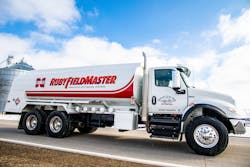Compression in a diesel engine is essential for effective and efficient performance. And when compression is lacking, damage can result. That’s why it’s imperative to know whether your engine’s compression is correct.
With a simple diesel engine compression test, it’s possible to spot compression problems before they get worse. Here’s information on these tests and how to decide if it’s time to perform one.
When should you get an engine compression test?
Diesel engine compression tests aren’t a preventive measure, but are performed if you’re having issues with your machine. If your vehicle is underperforming or experiencing a combination of the issues below, consider a diesel engine compression test.
- Starting problems unrelated to weather or outdoor temperature
- Poor fuel economy or increased oil consumption
- Blue smoke
- Unexplainable loss of power
- Excessive crank case pressure
How do diesel engines compression tests work?
Within a diesel engine, pistons move in a vertical motion, sucking in air as they go. This movement creates the heat needed to ignite fuel, ultimately powering the engine.
When you bring your vehicle in for a compression test, a mechanic places a gauge into each of the cylinders to read how much pressure the engine is producing when the engine turns over.
Generally, each cylinder should have 300 to 500 PSI, and all cylinders in a single engine should measure within 10 percent of each other. If the compression in the engine is too low, too high or deviates too drastically from one cylinder to the next, you likely have internal damage to your engine.
Diesel engines require proper compression to deliver high performance. Using superior products like Cenex premium diesel fuel and high-quality lubricants will help protect engines and ensure healthy compression levels. To learn more, contact a Cenex location near you.
About the Author
Chad Christiansen
Product quality and additives manager
Chad Christiansen has a decade of experience in the cooperative energy business with a background in agriculture and natural resource management. He started his career in sales with CHS and has experience in the cooperative system. Chad is technical expert and product specialist for Cenex Premium Diesel, TOP TIER gasoline and E15 fuels. He holds a Bachelor of Science degree from Kansas State University and has worked with CHS since 2009.
